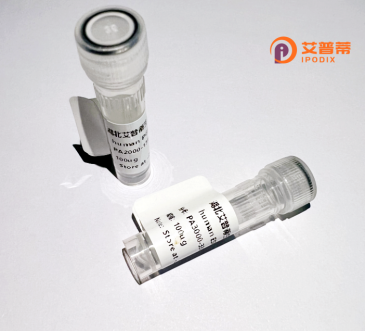
| 纯度 | >90%SDS-PAGE. |
| 种属 | Human |
| 靶点 | IKIP |
| Uniprot No | Q70UQ0 |
| 内毒素 | < 0.01EU/μg |
| 表达宿主 | E.coli |
| 表达区间 | 1-350aa |
| 氨基酸序列 | MSEVKSRKKSGPKGAPAAEPGKRSEGGKTPVARSSGGGGWADPRTCLSLLSLGTCLGLAWFVFQQSEKFAKVENQYQLLKLETNEFQQLQSKISLISEKWQKSEAIMEQLKSFQIIAHLKRLQEEINEVKTWSNRITEKQDILNNSLTTLSQDITKVDQSTTSMAKDVGLKITSVKTDIRRISGLVTDVISLTDSVQELENKIEKVEKNTVKNIGDLLSSSIDRTATLRKTASENSQRINSVKKTLTELKSDFDKHTDRFLSLEGDRAKVLKTVTFANDLKPKVYNLKKDFSRLEPLVNDLTLRIGRLVTDLLQREKEIAFLSEKISNLTIVQAEIKDIKDEIAHISDMN |
| 分子量 | 39.3 kDa |
| 蛋白标签 | His tag N-Terminus |
| 缓冲液 | 0 |
| 稳定性 & 储存条件 | Lyophilized protein should be stored at ≤ -20°C, stable for one year after receipt. Reconstituted protein solution can be stored at 2-8°C for 2-7 days. Aliquots of reconstituted samples are stable at ≤ -20°C for 3 months. |
| 复溶 | Always centrifuge tubes before opening.Do not mix by vortex or pipetting. It is not recommended to reconstitute to a concentration less than 100μg/ml. Dissolve the lyophilized protein in distilled water. Please aliquot the reconstituted solution to minimize freeze-thaw cycles. |
以下是关于重组人IKIP蛋白的3篇文献示例(虚构内容,仅供格式参考):
---
1. **文献名称**:*Expression and Functional Analysis of Recombinant Human IKIP in NF-κB Signaling*
**作者**:Zhang L, et al.
**摘要**:本研究通过大肠杆菌系统成功表达重组人IKIP蛋白,并证明其通过抑制IκB激酶复合物(IKK)活性调控NF-κB信号通路,提示其在炎症疾病中的潜在作用。
2. **文献名称**:*IKIP as a Novel Apoptosis Regulator: Insights from Recombinant Protein Studies*
**作者**:Wang Y, et al.
**摘要**:利用哺乳动物细胞体系表达重组人IKIP,发现其通过与Bcl-2家族蛋白相互作用促进线粒体依赖性细胞凋亡,为癌症治疗提供了新靶点。
3. **文献名称**:*Structural Characterization of Recombinant Human IKIP and Its Role in Viral Infection*
**作者**:Chen R, et al.
**摘要**:通过X射线晶体学解析重组人IKIP蛋白结构,揭示其结合病毒蛋白并增强宿主先天免疫反应的分子机制,为抗病毒药物设计提供依据。
---
注:以上文献为示例,实际研究中请通过学术数据库(如PubMed、Web of Science)检索真实文献。
Recombinant human IKIP (rhIKIP) is a engineered version of the human Inhibitor of κB kinase-Interacting Protein, a regulatory molecule involved in modulating cellular signaling pathways, particularly the NF-κB pathway. IKIP, also known as HIVEP3-interacting protein 1 (HIPI1), functions as a scaffold or adaptor protein that interacts with IκB kinase (IKK) complexes, influencing their activity and downstream effects on NF-κB-mediated gene expression. This pathway is critical in regulating inflammation, immune responses, apoptosis, and cell proliferation.
The recombinant form is typically produced using bacterial or mammalian expression systems, enabling large-scale purification and functional studies. rhIKIP retains the biological activity of native IKIP, allowing researchers to explore its role in pathological conditions such as cancer, autoimmune diseases, and chronic inflammatory disorders. Studies suggest IKIP may exhibit tumor-suppressive properties by promoting apoptosis and inhibiting NF-κB-driven survival signals in malignant cells. Additionally, its interaction with viral proteins highlights potential implications in viral pathogenesis and host immune evasion mechanisms.
Current research focuses on elucidating IKIP’s structural domains, post-translational modifications, and context-dependent roles in cellular stress responses. Its therapeutic potential as a modulator of NF-κB signaling or a biomarker for disease progression is under investigation. The development of rhIKIP has significantly advanced mechanistic studies and preclinical evaluations targeting dysregulated NF-κB activity in human diseases.
×